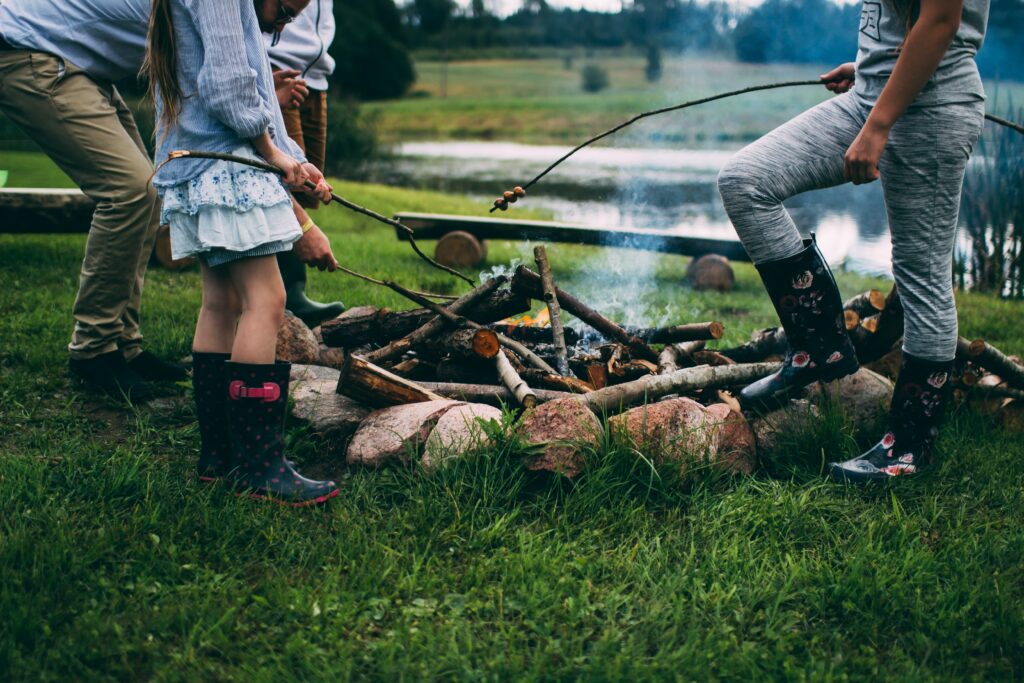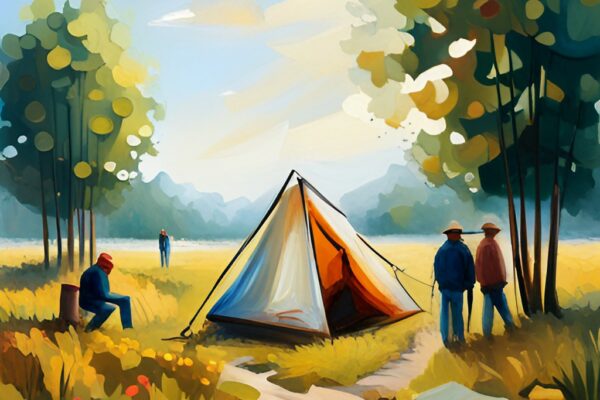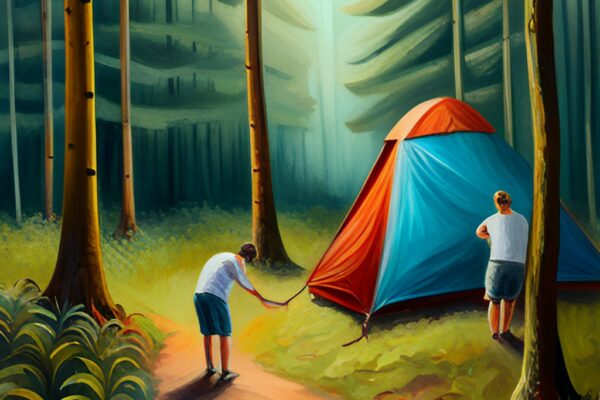
Tent camping with young children can be an amazing opportunity for all involved.
First, you’ll need to understand which factors to consider to determine if you should bring young kids tent camping. Then, we will cover everything you need to do if you decide to bring them along to make it a great experience for all. Taking the time beforehand to plan and prepare a safe and enjoyable time.
Factors to Consider For Bring Young Kids Tent Camping
Whether or not to bring young kids tent camping is a decision that depends on a number of factors. Here are some things to consider when deciding whether to bring young children on a tent camping trip:
- Age: Young children, especially infants and toddlers, require a lot of attention and care, which can make camping more challenging. Children who are old enough to walk and explore on their own may enjoy camping more than younger children.
- Experience: If your child has never been camping before, it may be a good idea to start with a shorter, less ambitious trip to see how they handle it. This can help you gauge their interest and comfort level and help you plan future trips accordingly.
- Safety: Safety should always be a top priority when camping with children. Be sure to choose a safe and appropriate campsite, and keep a close eye on young children at all times, especially around the campfire and bodies of water.
- Comfort: Young children may have a harder time adjusting to sleeping in a tent and being away from their familiar surroundings. Be sure to bring comfort items like their favorite stuffed animal, blankets, pillows, and appropriate clothing for the weather conditions.
- Interest level: Children interested in nature and outdoor activities may enjoy camping more than those not. Make sure to plan age-appropriate activities that your child will enjoy.
Ultimately, the decision to bring young kids tent camping is a personal one that depends on your child’s age, experience, safety, comfort, and interest level. With proper planning and preparation, camping can be a fun and rewarding experience for the whole family.
Kid Age Considerations for Tent Camping
When deciding whether or not to bring young kids on a tent camping trip, age is an important factor to consider. Infants and toddlers require a lot of attention and care, making camping more challenging for parents. Younger children may have a harder time adjusting to the unfamiliar environment, unable to communicate their needs effectively, and may be more prone to accidents or injury. Here are some things to consider when bringing young children on a camping trip:
- Infants: Infants require constant care and attention, including regular feedings and diaper changes. Camping with an infant can be challenging, especially if the campsite does not have easy access to running water or a bathroom. However, with proper planning and preparation, bringing an infant on a camping trip is possible.
- Toddlers: Toddlers are curious and active, which can be both a blessing and a challenge when camping. They may enjoy exploring the outdoors, but also require close supervision to ensure their safety. Toddlers may have difficulty sleeping in a tent and require a lot of attention during the day.
- Preschoolers: Preschoolers are generally more independent and may be able to participate in outdoor activities like hiking, fishing, and swimming. They may also be able to help with campsite chores like setting up the tent or cooking.
- Older children: Older children who can walk and explore independently may enjoy camping more than younger children. They may be able to participate in more challenging activities and require less supervision.
When deciding whether to bring young children camping, it is important to consider their age, developmental stage, and comfort level and experience with camping.
Kid Experience Considerations for Tent Camping
When deciding whether to bring young kids tent camping, it’s important to consider their experience level with camping. If your child has never been camping before, it may be a good idea to start with a shorter, less ambitious trip to see how they handle it. Here are some things to consider when planning a first camping trip for your child:
- Choose a beginner-friendly location: When planning your child’s first camping trip, choose a location that is beginner-friendly and easy to access. This can help make the experience less intimidating and more enjoyable for your child. Look for a campsite close to home with easy access to amenities like bathrooms and running water.
- Bring familiar items: Children thrive on routine and familiarity, so be sure to bring items that your child is familiar with, such as their favorite stuffed animal, blanket, or toy. This can help them feel more comfortable and at ease in the new environment.
- Plan fun activities: To make the experience more enjoyable for your child, plan fun activities that they will enjoy, such as hiking, fishing, or making s’mores around the campfire. Encourage your child to explore the outdoors and discover new things.
- Be flexible: Remember that camping with young children can be unpredictable, so be prepared to be flexible and adjust your plans as needed. Allow for plenty of breaks and downtime, and be open to changing plans if your child is tired or needs a break.
By starting with a shorter, less ambitious camping trip, you can gauge your child’s interest and comfort level and help plan future trips accordingly.
Safety Considerations for Tent Camping With Kids
When camping with children, safety should always be a top priority. Here are some things to keep in mind to ensure a safe camping trip for your family:
- Choose a safe campsite: When choosing a campsite, look for one that is safe and appropriate for your family’s needs. Check for potential hazards like steep drop-offs, rocky terrain, or bodies of water that could pose a danger to young children.
- Keep a close eye on young children: Young children require constant supervision, especially in a new and unfamiliar environment. Be sure to keep a close eye on your children at all times, especially around the campfire and bodies of water. Ensure they wear appropriate footwear and clothing to protect them from cuts and scrapes.
- Set clear rules and boundaries: Set clear rules and boundaries for your children, and ensure they understand the consequences of breaking them. Teach them about fire safety and how to behave around wildlife.
- Bring a first-aid kit: Bring a well-stocked first-aid kit with you on your camping trip, and ensure you know how to use it. Be prepared to handle common injuries like cuts, scrapes, and insect bites.
- Stay weather-aware: Check the weather forecast before you leave for your camping trip, and be prepared for weather changes. Bring appropriate clothing and gear to protect your family from rain, wind, and cold temperatures.
By keeping these safety tips in mind, you can ensure a safe and enjoyable camping experience for your family. Remember that safety is a top priority, and that with proper planning and preparation, you can minimize the risks and maximize the fun.
Comfort Considerations for Tent Camping With Kids
When tent camping with young children, it’s important to make sure they are comfortable in their new surroundings. Here are some tips to ensure your child’s comfort during your camping trip:
- Bring comfort items: Bring comfort items from home that your child is familiar with, such as their favorite stuffed animal, blanket, or pillow. These items can help your child feel more secure and comfortable in the new environment.
- Dress appropriately: Dress your child in appropriate clothing for the weather conditions. This includes layers for colder weather and sunscreen and hats for warmer weather. Make sure your child is wearing comfortable shoes that are suitable for hiking or other outdoor activities.
- Plan for comfortable sleeping arrangements: Sleeping in a tent can be a new and challenging experience for young children. Make sure your child has a comfortable sleeping bag and an appropriate sleeping pad or air mattress. Bring extra blankets or pillows if needed to ensure that your child stays warm and comfortable throughout the night.
- Set up a cozy campsite: Make your campsite cozy and comfortable for your child by setting up a comfortable seating area and creating a relaxing atmosphere. Bring a camp chair or blanket to sit on and set up a cozy campfire with plenty of blankets and chairs.
By taking these steps to ensure your child’s comfort during your camping trip, you can help make the experience more enjoyable for everyone. Remember that young children may take time to adjust to new surroundings and be patient and understanding as they settle into the new environment.
Interest-Level Considerations for Tent Camping With Kids
When planning a camping trip with children, it’s important to consider their interests and plan activities that will engage and excite them. Here are some tips to ensure your child’s interest during your camping trip:
- Research the area: Research the area where you will be camping to find out about local parks, trails, and other outdoor activities that may interest your child. Look for hiking, fishing, or swimming opportunities, and plan to explore the natural surroundings.
- Involve your child in planning: Involve your child in the planning process and ask for their input on activities and outings. This will help your child feel more invested in the trip and will give them a sense of ownership and responsibility.
- Bring outdoor games and toys: Bring outdoor games and toys like frisbees, soccer balls, and kites to keep your child entertained and engaged. These activities can also help your child develop their motor skills and coordination.
- Teach your child about nature: Use your camping trip as an opportunity to teach your child about the natural environment and local wildlife. Go on nature walks, point out different plants and animals, and talk to your child about conservation and sustainability.
- Encourage exploration: Encourage your child to explore their surroundings and discover new things. Let them climb trees, play in the dirt, and get their hands dirty. This sense of exploration and discovery can help foster a love of nature and the outdoors.
By planning age-appropriate activities and involving your child in the planning process, you can help ensure that your child remains interested and engaged during your camping trip. Remember to be flexible and open to new experiences, and to encourage your child’s curiosity and sense of adventure.
How to plan and prepare for a Tent Camping Trip With Young Kids
When packing for a camping trip, bring plenty of kid-friendly activities they can enjoy while in the campsite. Coloring books, board games, cards or simple outdoor play items like frisbees are all good choices. Bring rain jackets, boots, and hats to prepare for any weather conditions. Bring along snacks that your kids will love so they stay energized throughout the day.
Before setting out on your adventure, review basic safety rules with your children, such as where they can and cannot go, how to stay away from fire, and what kind of wildlife may be present. Ensure your children have a whistle if they get separated from you.
When it’s time to set up camp, show them the importance of setting up the tent correctly and safely. Teach them how to use basic camping gear like lanterns or cooking stoves – if age appropriate – so that they feel comfortable with their newfound skills when out in nature. Finally, make sure you explain to your kids where the restroom is located, especially if there are only rustic facilities nearby.
What you should avoid doing to ensure kids have fun with tent camping
To ensure that your child has a fun and enjoyable experience while tent camping, there are certain things that you should avoid doing. Here are some tips to help your child have a positive experience:
- Don’t force your child to participate: It’s important to let your child take the lead when it comes to participating in camping activities. Avoid forcing them to do something they don’t want to do, as this can create negative associations with camping and make them less likely to want to come back.
- Avoid overpacking: Bringing too much gear and equipment can make the camping experience more stressful and less enjoyable for everyone. Stick to the essentials and avoid bringing unnecessary items that will clutter up your campsite and take up valuable space.
- Don’t neglect safety: Safety should always be a top priority when camping with children. Avoid putting your child in dangerous situations, and always keep a close eye on them, especially around the campfire and bodies of water.
- Avoid strict schedules: While having a plan for your camping trip is important, it’s also important to be flexible and allow for spontaneity. Avoid strict schedules and allow your child to explore and discover new things on their own time.
- Don’t forget to have fun: The most important thing when camping with children is to have fun! Avoid getting too caught up in planning and preparation, and remember to enjoy the experience with your child.
By avoiding these common mistakes and focusing on creating a fun and positive experience for your child, you can help foster a love and appreciation for the great outdoors that will last a lifetime.
Tent Camping With Young Kids-Conclusion
In conclusion, bringing young kids tent camping can be a wonderful experience for the entire family. It provides an opportunity to disconnect from technology and connect with nature, to unplug from the daily grind and plug into quality time together. Although it may require more preparation and patience, the memories and experiences gained from camping together are truly priceless.
From roasting marshmallows to telling stories around the campfire, young kids will have a blast exploring the outdoors and learning new skills. So pack up the tent and sleeping bags, gather the family and start your adventure in the great outdoors.














